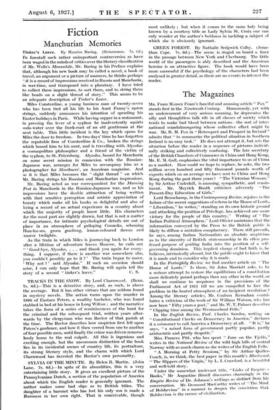The Magazines
MR. FORD MADOX FORD'S fanciful and amusing article " Pax '' stands first in the Nineteenth Century. Humorously, yet with an undercurrent of very serious meaning, he deprecates the silly and thoughtless talk rife in all classes of society which tends to make bad blood between nations—the sort of inter- national scandalmongering whose collective effect might be war. Mr. R. M. Fox in " Retrospect and Prospect in Ireland" admits that to summarize the political situation in Southern Ireland is no easy task." He does not attempt it, but sets the situation before the reader in a sequence of pictures individ- ually striking and collectively confusing. The late secretary of the British Chambers of Commerce in China and Hong Kong, Mr. E. M. Gull, emphasizes the vital importance to us of China as a market. How could we hope to replace, he asks, the two million seven hundred and fifty thousand pounds worth of exports which on an average we have sent to China and Hong Kong during the past three years? " The Victorian Woman," by Sir Arthur Underhill, is amusing, sympathetic, and remin- iscent. Mr. Meyrick Booth criticizes adversely '• The Present-Day Education of Girls."
Lord Beauchamp, in the Contemporary Review, rejoices in the failure of the recent suggestions of reform in the House of Lords.
Liberalism," he writes," standing on its own historic ground and attacking the position of Privilege, has achieved one more victory for the people of this country." Writing of The Indian Political Atmosphere," Lord Olivier maintains that the information conveyed by the Press to the British public is likely to diffuse a mistaken complacency. There still prevails, he says, among Indian Nationalists an absolute scepticism as to the sincerity of British statesmanship in its often pro- fessed purpose of guiding India into the position of a self- governing dominion. This implicit charge of bad faith is, he believes, intrinsically absurd, but the public ought to know that it is made and to consider why it is made.
In the Fortnightly Review we find another article on The House of Lords." Is there, Sir John Marriott asks, to be a serious attempt to restore the equilibrium of a constitution more delicately poised perhaps than any other in the world, or shall we continue to acquiesce in the provisions of the Parliament Act of 1911 till we are compelled to face the problem in the heated atmosphere of an incipient revolution ? Among the literary articles, Mr. Coulson Kernahan contri- butes a criticism of the work of Sir William Watson, who has now been " Fifty years a poet," and Mr. W. T. Palmer describes " Clipping time among the Westmorland Fells."
In the English Review, Pmf. Charles Sarolea, writing on " Constitutional Checks on Democracy in America," declares it a misnomer to call America a Democracy at all. " It is," he says, " a mixed form of government partly popular, partly aristocratic and partly despotic."
Miss Frances Pitt, who has spent " June on the Fjelds," Writes in the National Review of the wild high hills of central Norway with as much charm as she writes of the English Fells. . " A Morning at Petty Sessions," by Sir Arthur Quiller- Couch, is, we think, the best paper in this month's Blackwood. " The Slippers of the Virgin," by L. I. Crawford, is a beautiful and well-told story.
Under the somewhat irrelevant title, "Links of Empire— Books," Mr Augustine Birrell discourses charmingly in the Empire Review of Dr. Johnson's writings as distinct from his conversation. Mr. Desmond MacCarthy writes of "The Mind of Bolshevism" in a manner to deepen the conviction that Bolshevism is the enemy of civilization.






































 Previous page
Previous page